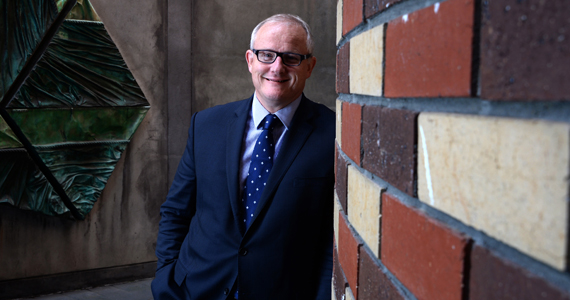Professor Calum Drummond, Deputy Vice-Chancellor Research and Innovation and Vice-President of RMIT University has been awarded the prestigious Victoria Prize in the Physical Sciences category, honouring his fundamental chemistry research, involving the Australian Synchrotron, that is enhancing industrial products and improving nanomedicine drug delivery for people with cancer.
Professor Drummond's research has led to design rules that were used to invent two patented drug delivery technologies, enabling drugs to be encapsulated in nanostructured material and diffused in a controlled manner to treat cancerous tumours.
The prize, one of two awarded last night at a ceremony in Melbourne, honours Professor Drummond’s contributions to understanding of key factors involved in molecular assembly in liquids, research completed in partnership with scientists on the Small and Wide Angle X-ray Scattering (SAXS/WAXS) beamline at the Australian Synchrotron.
By devising a new method of high-throughput analysis on the SAXS/WAXS beamline, Professor Drummond and his team from RMIT University and CSIRO were able to investigate thousands of liquid and liquid crystal samples a day, greatly increasing the number of known molecules capable of self-assembling in solvents to form materials with ordered 2D and 3D internal nanostructures.
Known as amphiphiles, these molecules can be used to create advanced nanostructured materials, with applications including nanomedicine, environmentally friendly off-shore oil well drilling fluids, waterproof recyclable paper coatings, household cleaning products, and specialty chemicals for the construction industry.
Professor Drummond says he is humbled and delighted to receive the Victoria Prize.
‘I have always been of the mindset that conducting excellent research is necessary but not sufficient, it is what you do with the excellent research to benefit others beyond the academic community that is most important.
‘My research is driven by the desire to innovate and make an impact, through understanding and solving problems faced by industry and the community.
‘It is a great honour for our work to be recognised. Scientific research is a team-based activity and this award also recognises my many research colleagues in CSIRO, RMIT and elsewhere.’
The annual Victoria Prize and Victoria Fellowships recognise the important role innovation plays in the state’s economic future, reinforcing the need for Victorians to be skilled in science, technology, engineering and mathematics (STEM).
Victorian Minister for Industry Lily D’Ambrosio has congratulated the winners of the prestigious awards.
‘Victoria’s reputation in science innovation is truly a testament to the high quality of innovators and researchers that our universities produce.
‘The Andrews Labor Government is committed to supporting Victorians in science, engineering and technology, to research in the areas that will help create industry growth, including local jobs and a stronger economy.’
Also last night, users of the Australian Synchrotron were awarded three of the six Victoria Fellowships in Physical Sciences: Dr Daniel Gomez from CSIRO, Dr Nisa Salim from Deakin University and Alex Schenk from La Trobe University.

